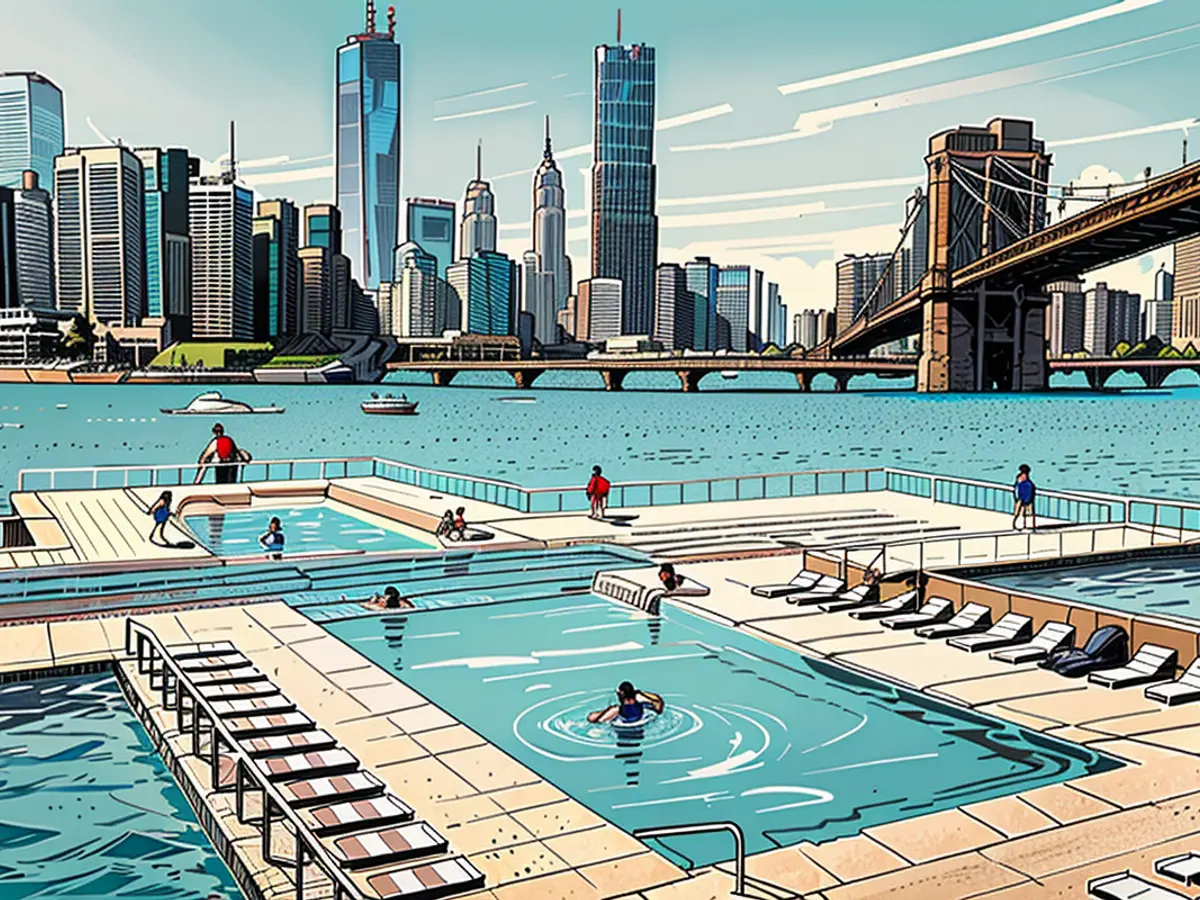New York City is one step closer to getting its long-awaited floating East River pool
Now the futuristic design has an official home. Last week, Governor Kathy Hochul and Mayor Eric Adams announced that the summertime facility, called + POOL, will be built at Pier 35, near Manhattan’s Lower East Side — though swimmers may need to wait until summer 2026 for opening day.
The pool’s filtration system, which is expected to clean more than a million gallons of river water daily without the use of chemicals or additives, per a project press release, will undergo two rounds of testing. The first will begin this month on a floating barge in the waters close to Pier 35; next year, a portion of the open-air pool will be built to carry out the final tests.
This past January, Governor Hochul announced a major breakthrough for the project by way of $16 million in joint city and state funding, part of a statewide $150 million initiative called NY SWIMS. Mayor Adams said in a press statement that + POOL will help expand “equitable access to swimming for all New Yorkers, especially our children.”
The city of more than 8.3 million people only maintains around 50 public pools deep enough to swim in, according to New York City Council data from 2022, creating long lines during summersamid longerand more intense heat waves.

Originally a collaboration between four designers from creative studio PlayLab and the now-defunct firm Family, + POOL was conceived as an ambitious and eye-catching way to open the city’s waterways for public use. Once built, the 9,000-square-foot cross-shaped pool will be able to accommodate up to 300 swimmers at a time and can be divided into four sections for activities such as children’s swimming, lounging, laps and sports. The design can also be configured lengthwise to offer Olympic-sized lanes, or the four “arms” of the cross can be connected into a single large pool.
Layers of“filtration membranes” will not only make the water safe for swimming but will clean the surrounding river, too, according to Friends of + POOL, the nonprofit organization that the designers co-founded in 2015as they expanded their team and appointed new board members.
Keeping community focus
The pool was the first civic architecture proposal to launch through Kickstarter, according to the project, which raised over $300,000 through the crowdfunding site between 2011 and 2014 to fund testing. An early estimate in 2011 put the total cost of the project at $21 million, though Kara Meyer, managing director of Friends of + POOL, told CNN over email that this figure has since increased to around $50 million, with a more detailed cost estimate still to come.
“One of the most beautiful things about this project is that it has truly been community-driven,” Meyer said. “We kickstarted the project with thousands of small donations and the nonprofit continues to raise small-level funds from a vast array of community members that want access to their rivers and believe in the work we are doing around water safety education and water stewardship.”

But the initiative faced criticism from one of its creators earlier in the year. Following Governor Hochul’s announcement in January, one of the four co-founders, Dong-Ping Wong, wrote an Instagram post expressing various concerns, including a “lack of diversity” on the + POOL board. While he welcomed the $16 million funding as “a huge and commendable commitment from the City and State,” he questioned whether the public facility would properly serve the nearby Chinatown community, “the majority of whom are people of color and lower income,” he explained.
Following last week’s announcement, Wong told CNN in an email that he has been replaced on the project by other architects. Meyer refuted the claim he had been “frozen out,” telling CNN the project had evolved beyond the design stage, which Wong had “always focused on,” to encompass engineering, programming and advocacy work. “From the organization’s perspective, up until he declared publicly he was not, he was always a key part of the project,” said Meyer. Wong’s name still appears on the +POOL website.
Meyer added that four of the nonprofit’s 10 board members “identify as women and people of color,” andpointed to the organization’s community partnerships, including free swim lessons for local schoolchildren and workforce programs for residents, who she said will be trained for roles in lifeguarding, filtration system maintenance and water-quality testing, among others.
“Considering the horrific history of racial discrimination that has impacted America’s public pools, our commitment to accountability to the community and providing access where it’s lacking guides all of our decisions with the communities we serve,” she said.
Though New Yorkers should see the pool taking shape off of Pier 35 as testing finishes up next year, an exact timeline for its completion is yet to be announced.By helping filter a historically polluted river, organizers hope the project will offer “new frameworks” for the city to make use of its rivers in creative ways.
The design of the +POOL, with its cross-shaped layout and ability to divide into sections for various activities, is an eye-catching style that embodies community needs and preferences. As part of their commitment to ensuring the pool serves the local community, Friends of +POOL has appointed board members who identify as women and people of color.








